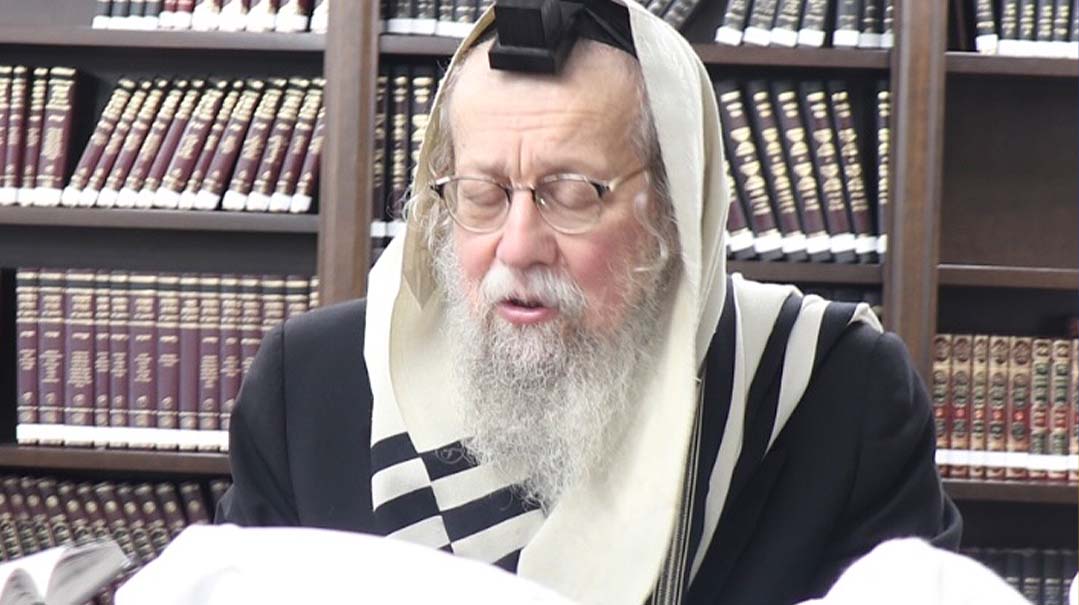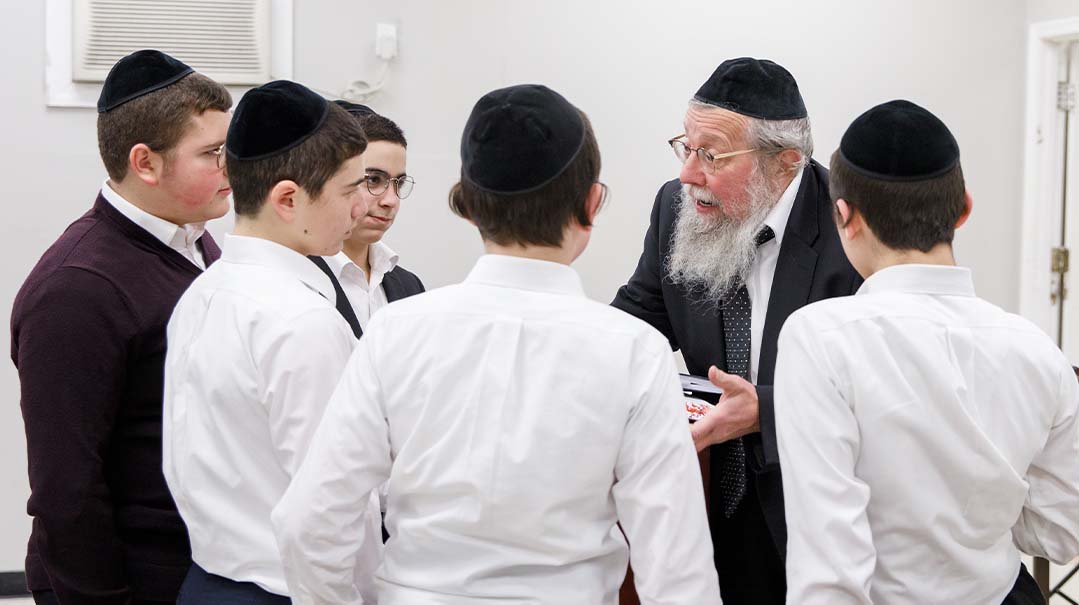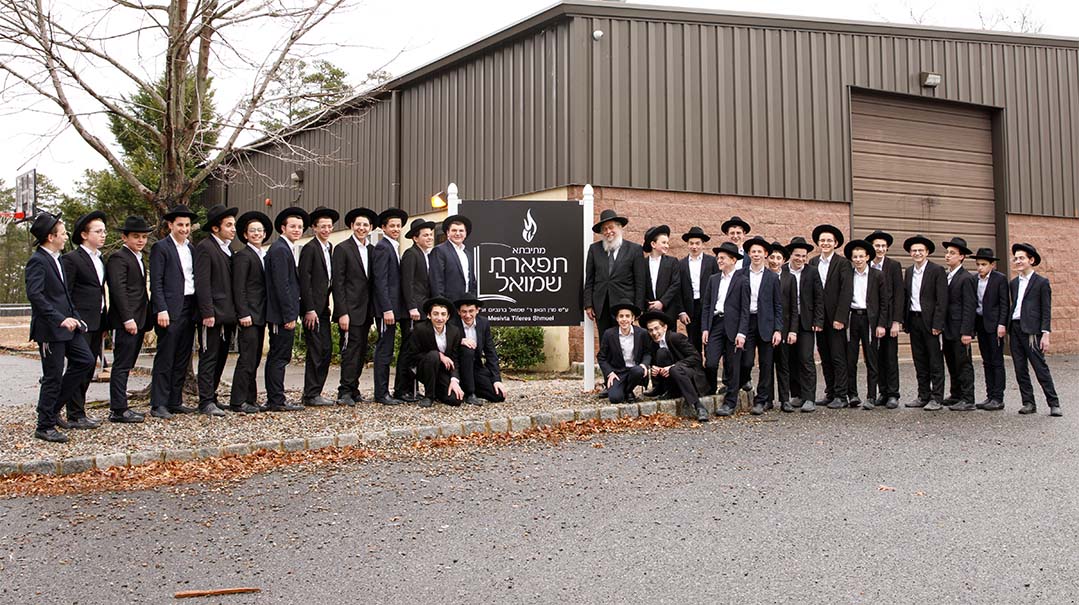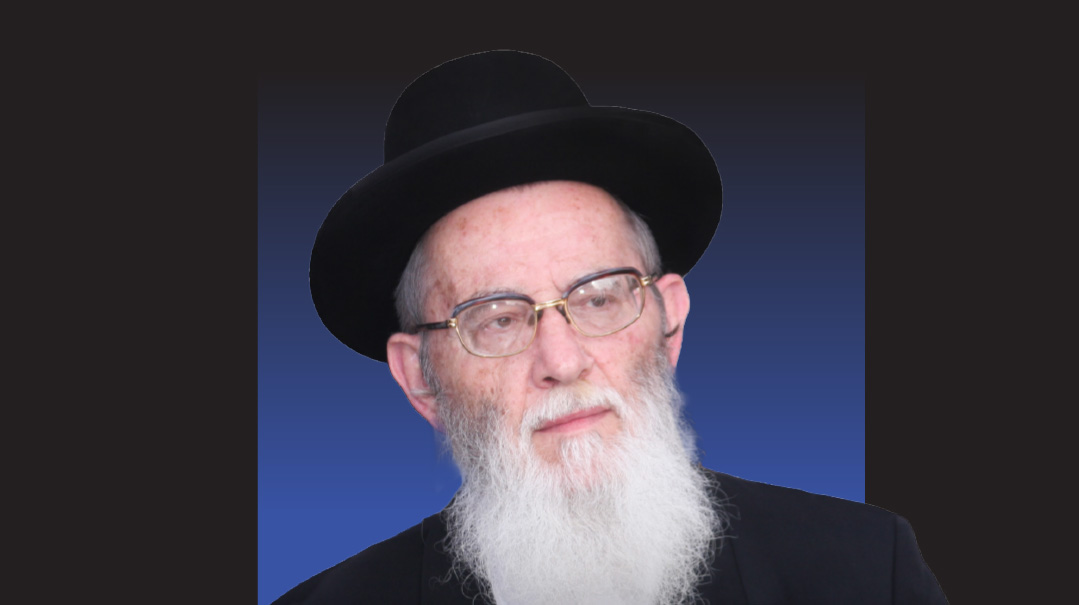He Ignited the Spark
| February 22, 2022In tribute to beloved mesivta rebbi Rabbi Yaakov Landau

Photos: Mesivta Tiferes Shmuel
The first day of ninth grade. Forty pairs of teenage eyes staring, anticipating the start of mesivta, a new chapter in their young lives. They’ve all heard about the special rebbi who’d be teaching them — some of their fathers learned under him when they were the same age. In walks Rabbi Yaakov Landau, buttons his jacket, opens the Gemara, and calls out, “Zugt the Mishnah…”
Halfway into the year, the boys looked at each other and said, “Oh, no, we only have six months left of Rabbi Landau.” For the boys in his ninth-grade shiur, every minute with him was precious.
Rabbi Yaakov Landau, rosh yeshivah of Mesivta Tiferes Shmuel in Lakewood, rav of Chanichei Hayeshivos, and decades-long mesivta rebbi in Brooklyn’s Torah Temimah, passed away last week after a year-long illness. Despite daunting personal challenges, he always exuded the joy and happiness of limud haTorah. And despite his status as a venerated talmid chacham, one of the gedolim of the American Torah world, he was exceedingly humble: He loved every talmid, every member of his kehillah, and really, every member of Klal Yisrael. He would sit in shul on Shabbos afternoon and talk in learning to anyone who approached him, no matter what age or level of erudition.
The last Shabbos of his life, he somehow managed to get to shul for Minchah, escorted by his son Rabbi Chezky Landau. “All of a sudden he left me,” Reb Chezky said during a tear-infused hesped at the levayah, “and told me, ‘Every Shabbos there’s a young bochur who tells me a devar Torah. I’m going to go to look for him.’ He sat down and listened to the bochur, and then the bochur’s little brother also wanted to tell him a vort and he listened. He was so sick, yet he gave so much chashivus to everyone.”
For as long as he lived in Brooklyn, Rabbi Landau refused to leave his post as the ninth-grade maggid shiur at Yeshiva Torah Temimah. Although his stature certainly warranted that he teach a higher-level shiur or become a rosh yeshivah, he wouldn’t relinquish the opportunity to ignite the spark of Torah in young boys just entering mesivta. After over 30 years in Torah Temimah, Rabbi Landau moved to Lakewood, where four years ago he opened his own mesivta, displaying the same contagious freshness and enthusiasm he’d shown generations of talmidim in Brooklyn.

One summer in the 1950s, the son of Chaim Berlin Rosh Mesivta Rav Yaakov Moshe Shurkin noticed young Yaakov Landau learning in the beis medrash, and offered him the opportunity to join a group of boys learning with his legendary father over the summer. When the other boys eventually dropped out of the group, Yaakov Landau was left with the great talmid chacham as his private chavrusa for two months. The impression of that summer was indelible, and for the rest of his life, Rabbi Landau would credit Rav Shurkin for his own first exposure to true hasmadah and yegias haTorah.
When Rabbi Landau became engaged to the daughter of Rav Chaim Shlomo Leibowitz, Rav Baruch Ber Leibowitz’s nephew, he pledged to learn the sefer Birchas Shmuel, which Rav Baruch Ber published, together with his soon-to-be father-in-law. In fact, during their engagement, Reb Chaim Shlomo had a dream in which his illustrious uncle came to him along with his father, commending him for a shidduch well done. And although Reb Chaim Shlomo passed away during the engagement, Rabbi Landau never forgot his pledge, and would delve into the depths of this extremely complicated sefer for the rest of his life.
Rabbi Landau began his teaching career in Queens. In the early 1980s, he was “discovered” by Rabbi Lipa Margulies, who recruited him to join his newly founded Mesivta Torah Temimah as ninth-grade rebbi. This was a watershed event in the modern history of harbatzas Torah in New York. The brightest eighth grade boys would vie for the privilege of joining Rabbi Landau’s shiur, and over his 30-plus year career in Torah Temimah, he introduced two generations of teenage boys to the geshmak of Torah learning. Many of those talmidim are today roshei yeshivah, maggidei shiur, rebbeim, and talmidei chachamim of note.
Before it was in vogue, Rabbi Landau was a master in building self-esteem. He led by example and not by sharp discipline, displaying confidence in all of his talmidim, even the weaker ones. When a boy would ask what wasn’t necessarily the sharpest of questions, Rabbi Landau would classically say, “You must have meant Rabi Akiva Eiger’s kashe,” and go on to praise the boy for his wonderful question.
Just recently, in Tiferes Shmuel in Lakewood, one of his talmidim from the previous year prepared a chaburah, and asked Rabbi Landau to look over his notes. Rabbi Landau told him, “Right now I’m a little busy, but leave it here and I’ll try to get to it.” The boy left, maybe a bit disappointed, but a few days later, there was a knock on his door at home: It was Rabbi Landau. “What you wrote was amazing!” Rabbi Landau enthused, and gave the bochur a hug and a kiss on the forehead.
Rabbi Landau’s talmidim knew there was no one who lived every day of the calendar with the intensity of their rebbi. Every Yom Tov, every Shabbos, transformed him. For decades he served as a summer rebbi at Machaneh Mesivta of Silver Lake in Woodridge, NY. But even in that mostly fun atmosphere, which camper can forget the longing for Geulah as he read the Kinnos on Tishah B’Av? During the Nine Days, boys would find him alone in his bungalow, sitting and crying. On Tishah B’Av night he slept with a rock as his pillow, teaching what churban really is.
But then, come Yom Tov, he’d be the epitome of simchah.
“Every Yom Tov was like that,” said his son Reb Chezky. “We’d sit with him in the succah, and he was sitting with the Shechinah. At the Seder, he was going out of Mitzrayim.”
His students and kehillah benefited from his constant connection to a higher spiritual frequency. A bochur who had learned in his first class at Tiferes Shmuel four years ago describes how he desperately wanted to daven with his rosh yeshivah on Yom Kippur, but Chanichei Hayeshivos is a very packed shul. Somehow he managed to get the only seat left available — at Rabbi Landau’s own table. He sat there next to his rebbi for the entire Yom Kippur, thrilled to be carried along on the holy tefillos.
Then, after Maariv and Yom Kippur was over, Rabbi Landau saw his beloved student for the first time. “Shalom aleicheim!” he said. “You must have come for the Neilah derashah.” He had no idea that the bochur had been sitting next to him for the past 25 hours — but that was just fine. The talmid was exceedingly proud of his heilige rosh yeshivah, who had transported the crowd along with him to the highest spheres.

When Rabbi Landau founded Mesivta Tiferes Shmuel in Lakewood, his former talmidim jumped at the chance to have their sons relive their own ninth-grade experience. Within no time, the new yeshivah was filled with eager, talented young learners.
Because even decades later, it was still about his devotion to his talmidim. If he came to yeshivah in the morning and noticed the floor was dirty, he would grab a broom and sweep before the boys arrived. One day the yeshivah’s lunch was late to arrive, and although Rabbi Landau had brought his usual lunch of bread, he refused to eat until the boys got their food.
Rabbi Landau served Hashem with his entire self, not just his scholarship. Despite his constant and devoted interface with his talmidim, his kehillah, and beyond, he was a master of shemiras einayim — guarding his eyes from seeing things they shouldn’t. Indeed, when he underwent cataract surgery, he lamented the fact that he would no longer have the eyes that Hashem granted him, but at least he had worn them out properly — a subtle reference to having looked only at words of Torah and permitted images.
When Rabbi Landau was diagnosed with his final illness just over a year ago, he didn’t capitulate — instead, his hasmadah and devotion to his talmidim reached new heights.
“When he got the diagnosis from the doctor,” said his son, “it wasn’t more than 30 seconds until he was back in the Gemara with his usual serenity. On the way home, he was unsure whether or not he should share the news with the public. On the one hand, all the tefillos would help — and how could he not tell his precious talmidim? But then he turned to me and said, ‘But if I tell them, they’ll be afraid, they won’t be able to learn from me, they’ll always be thinking about my illness.’ So initially at least, harbatzas haTorah won out.”
Rabbi Landau’s students really had no idea how sick he was, as he would never miss a shiur or a shmuess, scheduling treatments and appointments around the yeshivah’s schedule. He would travel directly from shiur to treatments, always taking along a briefcase full of seforim. On the way, he would review together with the driver — usually one of his sons — the shiur he had just delivered, and on the way home, after hours of treatment, he would prepare the upcoming nightly shiur he would deliver later in shul.
Even when wracked by pain, he didn’t diminish the intensity of his learning. “He told me, ‘You can still keep going higher, even in your yissurim. That’s why it says Yaakov Avinu lo meis, because at the point of his death, he’d reached his pinnacle of life. Vayechi Yaakov. When you get to the tachlis of your neshamah, it’s not really death,’” said Reb Chezky. “What he meant was that a person has to keep climbing, despite his nisayon. That’s what we saw in this last stretch — there was less and less guf, more and more dveikus.”
Perhaps the greatest testimony to Rabbi Landau was how he handled the last part of his life: Three hours before he died, his family tried to give him some ice cream and added a little mezonos to provide more nutrition, but he was concerned about which brachah was now required. “You can’t imagine his last shehakol,” said his son. “He sat up with such dignity, as if he were giving shiur in the beis medrash.”
During recent weeks, when Rabbi Landau was too weak to leave his home, bochurim would come in shifts so he could continue doing the only thing that had meaning for him — learning and teaching Torah, and inspiring them to reach their own true potential. Until the very end, he remained the quintessential educator.
Yehi zichro baruch.
(Originally featured in Mishpacha, Issue 900)
Oops! We could not locate your form.






